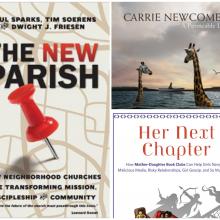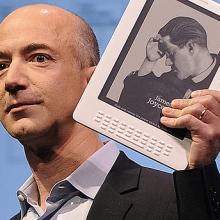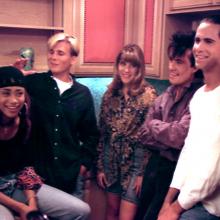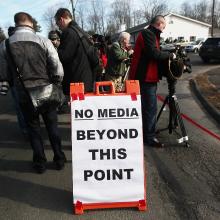Media
In response to the death of Michael Brown, many people are using the hastag #IfTheyGunnedMeDown on Twitter to consider the role that images used by the media have on the public's perception of vicitms.
Which picture would the media use #iftheygunnedmedown the left or the right? pic.twitter.com/BXGjJFvRco
— Adam SLANDER (@mr_mookie) August 10, 2014
Here's more according to the Washington Post:
The concern is how media will portray a dead child’s life after he’s slain by police officers. This is the stuff of#IfTheyGunnedMeDown, a Twitter hashtag that trended Sunday as part of the conversation surrounding the death of Michael Brown. Brown, 18, was an unarmed black teenager slain in Ferguson, Mo. He’d recently graduated high school. Black users shared pictures of themselves at their best — in uniforms or caps and gowns — juxtaposed with images that would garner less sympathy and perhaps paint more tawdry pictures of their lives.
The hum of 24-hour “news” drones on in the background most of my days. I’m not quite sure what television media's version of “Breaking” means anymore, though what accompanies it is closer to this Saturday Night Live spoof than real life.
Something is always “breaking.” And someone is always responding. We feel the need to get there first, to offer the most unique point of view, to lend our “expertise,” or to speak on behalf of our [fill-in-the-blank]. Organization? Generation? Gender? Or some cross-section of all of the above?
I know. I can definitely be part of the problem, and in this, I attempt my confession — sometimes my judgment fails me and I fall into the trap of the sensationalized newsbyte. I’m the web editor of a publication — meaning, I solicit, edit, sometimes even write some of these responses, of which there are a variety.
We have the “first response.” They are those who get there immediately. On television, these might come with the Impact font-ed “Exclusive,” or even “First to Report” (gross). Sometimes they just recount the events. Often, they will include — whether by slant storytelling or outright commentary — their reaction to said events.
Then there’s the “second-day response.” More nuanced, and typically with corrected “facts” that first responders didn’t mind repeating ad nauseam the day before, these reports put the events into greater historical context — or at least whatever context the writer could whip together from Wikipedia entries and closest possible “expert.” (We have a missing plane? Look, here’s a flesh-and-blood PILOT to explain what happened.)
From there, you get the out-and-out commentary. The “here’s my take,” or “this is whose side I’m on.” Rarely unique, though under the constant illusion of specialness, these commentaries attempt to stake out ground for a person or group of people. This happened, here’s how it happened, and here’s where I [we] stand on it.
Inevitably, you’ll then get the response to the response: How dare you stand there! She’s missing the whole point of [news-making event].
And on it goes.
Reading Power
Her Next Chapter: How Mother-Daughter Book Clubs Can Help Girls Navigate Malicious Media, Risky Relationships, Girl Gossip, and So Much More advises on everything from basic setup to navigating challenging topics. By educational psychologist and girls’ empowerment advocate Lori Day, with her daughter, Charlotte Kugler. Chicago Review Press
Slices of Life
Fresh on the heels of an essay collection (The Thorny Grace of It: And Other Essays for Imperfect Catholics, Loyola Press), Portland Magazine editor Brian Doyle now offers prose poems that capture prayers, piercing insights, and luminous moments with craft and frequent wit in A Shimmer of Something: Lean Stories of Spiritual Substance. Liturgical Press
I grew up in the days of the encyclopedia salesman. I clearly remember the day when a clean-cut well-dressed man knocked on our apartment door to sell the 26-volume World Book Encyclopedia.
We were recent immigrants and could not speak English fluently. We had few worldly possessions and the last thing we needed in our house was a 26-volume encyclopedia.
After the hour presentation during which we flipped through the volumes full of exciting information, my dad said no. The salesman looked sad and pitiful as he packed his sales kit. As he exited the door, he gave one last pitch and, suddenly, my dad changed his mind and we bought the whole set.
Either the salesman was good or my parents had this strong desire that their children needed to know “everything there is to know about the world.” Maybe it was a bit of both.
In 2014, long gone are those 26-volume encyclopedias that once filled the bookshelves of many of my childhood friends’ homes. Now we have everything that we need to know at our fingertips through iPads, computers, cell phones, or other gadgets.
I tend toward the “eat, drink, and be merry” life philosophy, popularized by the Bible, and also Dave Matthews Band. Growing up in a very large, very loud, very food-centric family in South Texas ingrained this in me, as we gathered many a Sunday around the table(s) to celebrate that month’s birthdays and talk politics, family businesses, and, mostly, the last Seinfeld episode. What you might call gluttony, I call Sabbath — and I’ll quote Scripture at you to prove my point.
So smug was I at my “breaking bread as Jesus did” epicurean lifestyle that I probably should be writing about pride instead. But a few weekends ago, while finishing up season two of House of Cards three days after it released — and also a bottle of Zinfandel — and taking eye-attention breaks to check my Facebook and Instagram feeds (that adorable photo of baby girl only garnered 64 likes?!), and to see how many steps my Fitbit recorded for the day (so much for that post-dinner Skinny Cow), I paused to reflect upon the concept of gluttony.
When does our reliance upon a constant stream of multi-channel entertainment and instant gratification become harmful?
FOR SEVERAL years now, a debate has raged over the issue of “net neutrality,” pitting media reformers, digital libertarians, and “content” companies such as Amazon and Netflix against old-school telecommunication giants such as AT&T and Comcast, with the Federal Communications Commission serving as an erratic referee.
Sometime early this year, the U.S. Court of Appeals for the District of Columbia may settle the question when it decides the case of Verizon vs. the FCC. If the court decides in favor of Verizon, big telecom companies will have won the right to decide what digital content we can receive, especially when it comes to video and other bandwidth-intense media.
Simply put, the issue in the Verizon case is whether broadband internet will follow the “common carrier” precedent applied to telephone lines and the electricity grid or the model of cable TV. The common carrier principle guarantees equal access to necessary public utilities. Applied to the internet, this has meant that service providers simply supply the fiber-optic cable or wireless spectrum, give equal access to all content providers, and charge the final recipient of the data (you and me) a fee that covers the cost of maintaining an adequate network.
In the cable TV business model, the provider controls the network of fiber optic cable and the content that goes over it. The cable company decides which channels are included in the basic package, which (like HBO) are purchased separately, and which will be unavailable at any price. If you want Al Jazeera instead of Fox News, too bad—it’s a take it or leave it package.
There was a lot to celebrate this year for women in the media. But some things aren't changing fast enough. Check out an overview of how the media treated women this year below courtesy of the folks over at Miss Representation.
“I think it would be fun to run a newspaper.”
THE QUOTE IS from Charles Foster Kane, the character based on William Randolph Hearst in Orson Welles’ 1941 classic Citizen Kane. But it could have been Amazon kingpin Jeff Bezos this August when he bought The Washington Post. What can you get for the man who has everything? Maybe he’d like a newspaper to play with, preferably one with global political clout.
Unlike Charles Foster Kane or Rupert Murdoch, Bezos seems disinclined to monkey with the content of the Post’s coverage. His business interests may require certain government policy directions—i.e. free trade and no unions—but on those questions the Post is already with him. They differ on net neutrality (the concept that providers of internet access should not be able to discriminate against or give preference to specific internet service or content providers), so that will be one to watch. But Bezos comes to the Post saying he essentially agrees with the paper’s politics. In fact the Post’s reputation as a credible voice for corporate centrism seems to be a large part of what Bezos wants for his $250 million.
This may explain why Bezos, a titan of the rising digital world, would weigh himself down with an ancient “legacy” institution. It’s an old American story. When you get rich enough (Bezos’ fortune is estimated at $27 billion), you don’t want more money, you want power and respect. The same process played out with the robber barons in the last century. It’s just that today the evolution happens much faster. It took three generations for the Rockefellers to go from oil tycoons to philanthropists and politicians; contemporary barons such as Bezos and Bill Gates have made the switch within a couple of decades.
In an evangelical Christian climate obsessed with change, cultural trends, and trying to stay up-to-date and relevant, it's easy to undervalue the elderly. The bestselling authors, the hottest worship bands, the superstar conference speakers, and megachurch pastors are all youngish, or at least certainly not elderly, and they’re mainly marketed towards younger to middle-aged audiences.
In many ways, Christians have suffered from the sin of apathy, being guilty of ignoring a large segment of believers — the elderly — who are continually forced into the shadows of our ministries, leadership structures, publicity campaigns, vision, and dialogue.
In an era where fast-paced technology rules the world, elderly Christians are losing their platforms for communication — and the rest of us are too busy to reach out to them. Social media, blogs, websites, tablets, and smartphones continually shrink access to an elderly population that is unable to keep up — and we aren’t waiting for them.
Are the media pulling their punches when it comes to Pope Francis?
Whether it’s because he carries his own bags or cold-calls troubled Catholics who write to him, or because he so clearly loves interacting with crowds or drives a beat-up Renault around the Vatican, it’s hard to tell. But at some point, much of the world’s media fell for the new pope.
Now an increasing number of Vatican insiders are asking whether the largely positive view of Francis affects the way the media cover the Holy See.
Eight years ago I left my dorm room, humming the hook to “Till I Collapse” on my walk to the bathroom. When I returned a new song was playing on my laptop. Ludacris’ “P-Poppin’” pierced through the thin walls and echoed down the hallway. I bobbed my head along and then sat down to finish my homework. I looked at the screen, and I thought I saw my sister.
One of the women on the screen in the strip club swinging around a pole trying to seduce Ludacris looked like Jennifer – my older sister.
And something began to shift.
“Be still and know that I am God.” - Psalm 46:10a
From April 29 to May 5 individuals, households, and communities will celebrate Screen-Free Week by disconnecting from their screens — TV, computers, games, mobile devices — during their free time and reconnecting with relatives, neighbors, the natural world, and the quiet voices that may be drowned out by the constant barrage of electronic noise. My neighborhood celebrated early so we could offer a variety of cost-free and screen-free family activities during the school's spring break week. I organized the celebration, as I've done for the last six years. It was satisfying to see kids slow down and engage in gardening, carpentry, music making, nature exploration …
I also observed Screen-Free Week myself. Seven days of fasting from electronic media showed me how much time I spend using then mindlessly and forced me to confront my idolatries that are fed or masked by this mindless use. I'm using Michael Schut's definition of idolatry:
"An idol is anything we put before God, a partial truth mistaken for the whole Truth, a lesser good elevated to the ultimate good. … Idols [promise] what they cannot deliver."
I’m not offering this as consolation to those who have lost someone they love, but as a warning. What’s true of those we love may be just as true of those whom we hate and fear: we become like what we worship, and we worship what we cherish in our hearts.
When people commit monstrous deeds, it is hard not to turn and stare in horror. Think about how hard it is to pull your eyes from the television even when none of the news is new, just the same breathless commentary about what we don’t yet know, what we still don’t understand about the latest act of terror.
When the monsters and their violence become our focus, they grow and become our gods. We’ve become very good at hurting one another, so of course we need to be vigilant. But it’s possible to take our fear too far, to let our natural reaction to sudden violence become a permanent policy of suspicion and terror. Then we are in danger of worshiping our would-be enemies. We don’t worship them joyfully, but we worship them anyway, the way we might worship any vengeful, unstable, wrathful gods: looking over our shoulders and fearing their power. If the best we can come up with is invective against immigrants, suspicion of people unlike us, and perpetually heightened security measures, it starts to look like our hearts are full of fear.
Be a part of the movement to redefine the public's perception of North Korea.
AS THIS IS written, the Federal Communications Commission is, again, preparing to rule on a revision of its media ownership rules that could, again, allow the few remaining mass media conglomerates to own even more of what are currently competing local news outlets. For one thing, the proposed revision would allow Rupert Murdoch's News Corporation to have its Los Angeles and Chicago TV stations and eat the L.A. Times and Chicago Tribune, too.
Five years ago, the Bush administration's FCC commissioners tried this move, but it was routed in a decision by a federal appeals court. But, just in time to quash any illusions that a second Obama administration might be less friendly to corporate power, Julius Genachowski, the Obama-appointed FCC chair, tried, at the end of 2012, to quietly slip in this new set of Murdoch-friendly ownership rules. The only reason it may not have happened already is because he raised the issue at the same time that an FCC report on minority media ownership arrived showing the share of outlets owned by people of color to be only 2.2 percent for commercial full-power television and 6.2 percent for commercial AM radio. This, needless to say, raises questions about the wisdom of further media consolidation.
Over the decades, this column has spilled a lot of ink on the subjects of the FCC, media policy, and, especially, media ownership. I haven't obsessed over these issues because of any love for the details of broadband allocation and other regulatory minutiae. In fact, I struggle to understand some of those matters just well enough to try and explain why they are important. But they are important, mostly because deregulated and monopolistic mass media impinge upon our ability to effectively exercise our God-given free will and participate rationally in the process of self-government.
This is the true story... of seven strangers... picked to live in a house...work together and have their lives taped... to find out what happens... when people stop being polite... and start getting real... The Real World.
The Real World was – and continues to be – a popular television show, and its influence is far greater than its core MTV viewing audience. Through its collection of diverse personalities and with a willingness to address controversial social issues, when The Real World first aired in May of 1992 it started what many would describe as our modern-day reality TV phenomenon. Not only did The Real World spark a new entertainment genre, but its impact was far greater, for it helped blur the lines between authentic and artificial. In other words, one can argue that The Real World sparked an ongoing transformation of what we perceive as real in our world.
As is the case with other reality TV shows, The Real World has received numerous allegations of being simulated and/or staged. Due to such accusations, some viewers are not convinced that The Real World is fully real. Some accuse MTV of shoddy and selective editorial choices that take events out of context, and as a result, give false impressions of what actually occurred in real time. And of course, some perceive the very concept of The Real World as a grand misnomer, for in the real world people do not live like those in The Real World, as few in our world can claim to live in cost-free luxurious dwellings in awesome cities under the watchful eye of camera crews who broadcast their daily actions for millions of viewers to see and scrutinize. For many, The Real World does not seem real at all.
In the time following our latest national tragedy in Newtown, Conn., many have wondered where God was in the midst of these horrific events. While such questions are indeed significant and deserve extended consideration (and thankfully, many have already addressed the subject), instead of wondering where God was, perhaps the time is upon us to also consider where we are.
While it is imperative to contemplate and debate the role and presence of God during such catastrophes, it is also critical to consider our collective response as a human community.
We often learn of tragic events through the lenses of news media, and of course, the various outlets possess mixed motives and results. While there is nothing inherently wrong with sharing the stories, there is fine line between seeking facts and invading privacy, and this boundary is too often crossed. In the hours immediately following the recent shootings in Connecticut, countless camera crews, photographers, and reporters crowded around devastated children and traumatized families. While some merely wished to share information and build awareness, others seemed to be more interested in ratings and profit. And so, while the debates surrounding media ethics in the aftermath of tragedy will surely continue, most would agree that even the most sensitive of camera crews, photographers, and reporters do not always create the most ideal setting for those enduring tragedy. For the sake of those who experience loss in the most heartbreaking of circumstances, we should demand something better.
A soft answer turns away wrath, but a harsh word stirs up anger. Proverbs 15:1
I often wonder how frequently people think about the impact their words have on others, specifically, on the development of human perception. The conclusion I’ve sadly reached is that when a language norm is established by dominant cultural forces —such as the news media, in our day – the truth seldom matters. Once something is spoken and repeated enough times people consider it to be true regardless of the real facts or circumstances.
One recent debate clearly illustrating the power of words is around which terminology the media should use when referencing immigrants who are in this country without authorization to work. Those outlets that use the word “illegal” defend this practice by pointing to the Associated Press’ Stylebook, which designates “illegal” as the appropriate term. Those using the term “undocumented” have noted the changing circumstances within the culture and recognize that using such inflammatory terminology only adds fuel to the proverbial political fire around the issue of immigration.
Can Tim Tebow do no wrong?
Michael Butterworth of Bowling Green State University has turned his attention to sports media coverage of Tebow, an evangelical Christian and New York Jets quarterback. The author of a forthcoming article in the journal of the National Communication Association, Butterworth talked about how Tebow coverage seldom treads beyond a “nice guy” image to delve into his faith.
Some answers have been edited for length and clarity.















